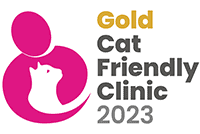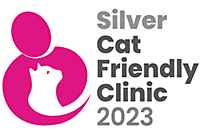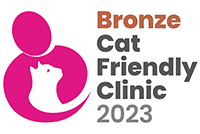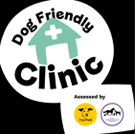Could you please introduce yourself and tell us a little about your career to date?
My name is Victoria, I grew up in North West London and went to study Veterinary Medicine at the Royal Veterinary College, graduating in 2013. As a newly graduated vet, I worked at a busy first opinion hospital which was a steep learning curve, and gave me invaluable experience, especially with emergencies. After that, I took some time out to travel and then worked all over London as a locum. Shortly after working as a locum for Village Vet, I took a permanent position with them.
Tell us about your own pet
I have an elderly cat call Phoebe, who has been a long-standing member of the family and has been with me throughout many life stages. We rehomed her as a young cat from Battersea and we think she had a litter of kittens before coming to us. These days she spends most of her time curled up by the radiator- it’s a cat’s life!
What challenges you the most about being a vet?
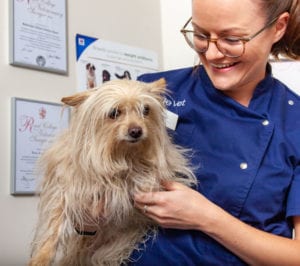 Being a vet brings a lot of challenges, but also a lot of rewards. One of the most challenging things is determining whether or not an animal is in pain, or is suffering, and knowing if we can do any more to help them. It’s also very hard to say goodbye to a pet that you’ve come to know very well, along with their owners.
Being a vet brings a lot of challenges, but also a lot of rewards. One of the most challenging things is determining whether or not an animal is in pain, or is suffering, and knowing if we can do any more to help them. It’s also very hard to say goodbye to a pet that you’ve come to know very well, along with their owners.
Why did you choose Village Vet?
I have worked at various practices since graduating, and during my time as a locum, I worked for Village Vet West Hampstead. I felt particularly comfortable with the team and liked the ethos of the company; to endeavour to deliver a gold standard of care. Working for a larger group means that we benefit from a wide support network of colleagues, including specialists in all fields.
At your practice, what are some of the most common preventable ailments that you come across and can you provide us 3 top tips in relation to them for pet parents?
 1) Dental disease! Teeth brushing is invaluable, especially in dogs. Given that our furry friends are not eating as they would in the wild, we need to give them a helping hand with their dental hygiene. Brushing from a young age means that we can keep their teeth clean, reduce bacterial load in the mouth, and prevent or delay the need for dental treatment under anaesthetic. When brushing isn’t possible, there are oral gels and food supplements which can also help. Often animals hide the fact that they are in pain, so regular vet checks of the mouth are essential to pick up any problems early and get them treated.
1) Dental disease! Teeth brushing is invaluable, especially in dogs. Given that our furry friends are not eating as they would in the wild, we need to give them a helping hand with their dental hygiene. Brushing from a young age means that we can keep their teeth clean, reduce bacterial load in the mouth, and prevent or delay the need for dental treatment under anaesthetic. When brushing isn’t possible, there are oral gels and food supplements which can also help. Often animals hide the fact that they are in pain, so regular vet checks of the mouth are essential to pick up any problems early and get them treated.
2) Obesity. We all know that maintaining a healthy weight benefits our lives in many ways, and animals are no different. Like humans, animals can suffer from Diabetes, and in cats, this is often a result of obesity. Joint problems are also exacerbated by obesity and a small amount of weight reduction can result in a massive clinical improvement. Owners can discuss weight management with both the vets and nurses who can help them to understand what might be going wrong and can introduce a different diet or exercise regime.
3) Parasites like lungworm. These can be really nasty, and in the case of lungworm, life-threatening. The good news is that they’re very easy to prevent. Monthly parasite treatment means that anything picked up will be killed before it has a chance to do harm. We’re now often using a tasty chew for dogs which a lot of people find easier and more convenient than a spot-on.
What advice would you give to future veterinarians who are thinking about a career in veterinary medicine?
Veterinary is a vocational career. It often comes with antisocial working hours and a lot of challenges and emotional stress. That said, it is extremely rewarding and fulfilling, especially if you work within a good team.






